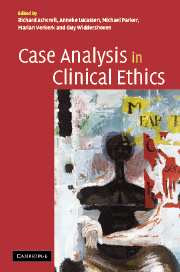Book contents
- Frontmatter
- Contents
- Notes on contributors
- Acknowledgements
- 1 Philosophical introduction: case analysis in clinical ethics
- 2 Families and genetic testing: the case of Jane and Phyllis
- 3 Family access to shared genetic information: an analysis of the narrative
- 4 A virtue-ethics approach
- 5 Interpretation and dialogue in hermeneutic ethics
- 6 ‘Power, corruption and lies’: ethics and power
- 7 Reading the genes
- 8 A utilitarian approach
- 9 A feminist care-ethics approach to genetics
- 10 A conversational approach to the ethics of genetic testing
- 11 Families and genetic testing: the case of Jane and Phyllis from a four-principles perspective
- 12 A phenomenological approach to bioethics
- 13 An empirical approach
- 14 Response to ethical dissections of the case
- 15 Philosophical reflections
- Index
- References
5 - Interpretation and dialogue in hermeneutic ethics
Published online by Cambridge University Press: 01 September 2009
- Frontmatter
- Contents
- Notes on contributors
- Acknowledgements
- 1 Philosophical introduction: case analysis in clinical ethics
- 2 Families and genetic testing: the case of Jane and Phyllis
- 3 Family access to shared genetic information: an analysis of the narrative
- 4 A virtue-ethics approach
- 5 Interpretation and dialogue in hermeneutic ethics
- 6 ‘Power, corruption and lies’: ethics and power
- 7 Reading the genes
- 8 A utilitarian approach
- 9 A feminist care-ethics approach to genetics
- 10 A conversational approach to the ethics of genetic testing
- 11 Families and genetic testing: the case of Jane and Phyllis from a four-principles perspective
- 12 A phenomenological approach to bioethics
- 13 An empirical approach
- 14 Response to ethical dissections of the case
- 15 Philosophical reflections
- Index
- References
Summary
In healthcare practice, patients and their caregivers can sometimes be confronted with complex and difficult problems. The situation confronting Jane and Phyllis in the case described in Chapter 2 is a good example. Should Jane have a mastectomy or not? This is not an easy question for her, or for those around her (her husband, her friends and the various healthcare professionals who are involved). Should Phyllis (be made to) cooperate by providing access to her test results? Although Phyllis is outspoken in her refusal, this does not mean that the professionals agree that the case is closed. Those who find themselves in cases such as this one are often uncertain about how to make sense of the situation in which they find themselves. They come up with solutions at one moment, and have doubts about them the next. The participants often have very different views about what is to be done, depending on their former experiences and background.
One way to approach such problems is to try to do away with ambiguities and to reach an objective impartial view of the situation. With this view, if people are hesitant about what would count as appropriate solutions, this is because they do not yet have enough information about risks and benefits, and have not adequately made up their minds about their preferences. Here, if people have different views of the situation, we need to investigate which view is (more) correct.
- Type
- Chapter
- Information
- Case Analysis in Clinical Ethics , pp. 57 - 76Publisher: Cambridge University PressPrint publication year: 2005
References
- 11
- Cited by

